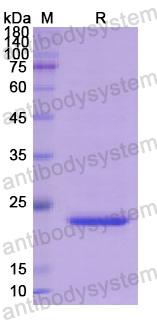Catalog No.
YHC29201
Expression system
E. coli
Species
Homo sapiens (Human)
Protein length
Phe201-Leu381
Predicted molecular weight
22.08 kDa
Nature
Recombinant
Endotoxin level
Please contact with the lab for this information.
Purity
>90% as determined by SDS-PAGE.
Accession
P07988
Applications
ELISA, Immunogen, SDS-PAGE, WB, Bioactivity testing in progress
Form
Lyophilized
Storage buffer
Lyophilized from a solution in PBS pH 7.4, 0.02% NLS, 1mM EDTA, 4% Trehalose, 1% Mannitol.
Reconstitution
Reconstitute in sterile water for a stock solution. A copy of datasheet will be provided with the products, please refer to it for details.
Shipping
In general, proteins are provided as lyophilized powder/frozen liquid. They are shipped out with dry ice/blue ice unless customers require otherwise.
Stability and Storage
Use a manual defrost freezer and avoid repeated freeze thaw cycles. Store at 2 to 8°C for frequent use. Store at -20 to -80°C for twelve months from the date of receipt.
Alternative Names
Pulmonary surfactant-associated protein B, Pulmonary surfactant-associated proteolipid SPL(Phe), SP-B, SFTPB, SFTP3, 6 kDa protein, 18 kDa pulmonary-surfactant protein
Stereological analysis of the naked mole-rat Heterocephalus glaber lung provides evidence of altered surfactant function and late alveolarization., PMID:40366775
A novel composite model for distinguishing benign and malignant pulmonary nodules., PMID:40366455
Genetic Disorders of Surfactant Metabolism., PMID:40306683
Surfactant protein levels and genetic variants as biomarkers for COVID-19 severity in children., PMID:39832502
Increased pro-SFTPB in HDL promotes the pro-inflammatory transition of HDL and represents a sign of poor prognosis in ARDS patients., PMID:39819672
Novel Immune Response Evasion Strategy to Redose Adeno-associated Viral Vectors and Prolong Survival in Surfactant Protein-B Deficient Mice., PMID:39805087
ABCA3 c.838C>T (p.Arg280Cys, R280C) and c.697C>T (p.Gln233Ter, Q233X, Q233*) as Causative Variants for RDS: A Family Case Study and Literature Review., PMID:39457702
Chronic Hypoxia in an EXTrauterine Environment for Neonatal Development Impairs Lung Development., PMID:39453404
Betamethasone improved near-term neonatal lamb lung maturation in experimental maternal asthma., PMID:39436639
Liquid Biopsy in Lung Cancer: Nano-Flow Cytometry Detection of Non-Small Cell Lung Cancer in Blood., PMID:39419350
The surfactant protein B polymorphisms (rs7316 and rs1130866) and their correlation with disease progression of COVID-19., PMID:39368228
A Comprehensive Consolidation of Data on the Relationship Between Surfactant Protein-B (SFTPB) Polymorphisms and Susceptibility to Bronchopulmonary Dysplasia., PMID:39245635
Influence of mesenchymal and biophysical components on distal lung organoid differentiation., PMID:39218985
A Comprehensive Compilation of Data on the Relationship Between Surfactant Protein-B (SFTPB) Polymorphisms and Susceptibility to Neonatal Respiratory Distress Syndrome., PMID:39159013
Plasma proteometabolome in lung cancer: exploring biomarkers through bidirectional Mendelian randomization and colocalization analysis., PMID:39011643
Causal association and shared genetics between telomere length and COVID-19 outcomes: New evidence from the latest large-scale summary statistics., PMID:38882679
SFTPB in serum extracellular vesicles as a biomarker of progressive pulmonary fibrosis., PMID:38855869
Proteome-Wide Multicenter Mendelian Randomization Analysis to Identify Novel Therapeutic Targets for Lung Cancer., PMID:38824092
Development of an in vitro human alveolar epithelial air-liquid interface model using a small molecule inhibitor cocktail., PMID:38500038
Comparative analysis of prognosis and gene expression in prostate cancer patients with site-specific visceral metastases., PMID:38433022
Longitudinal plasma proteomic analysis identifies biomarkers and combinational targets for anti-PD1-resistant cancer patients., PMID:38349411
Construction of a Lung Adenocarcinoma Prognostic Model Utilizing Serine and Glycine Metabolism-Related Genes., PMID:38212294
Preterm birth affects both surfactant synthesis and lung liquid resorption actors in fetal sheep., PMID:38081502
Towards personalized therapies for genetic disorders of surfactant dysfunction., PMID:38036307
Molecular subtyping based on immune cell marker genes predicts prognosis and therapeutic response in patients with lung adenocarcinoma., PMID:38001428
Spatially distinct molecular patterns of gene expression in idiopathic pulmonary fibrosis., PMID:37978501
Multidimensional progressive single-cell sequencing reveals cell microenvironment composition and cancer heterogeneity in lung cancer., PMID:37956258
Downregulation of pro-surfactant protein B contributes to the recurrence of early-stage non-small cell lung cancer by activating PGK1-mediated Akt signaling., PMID:37946295
A promoterless AAV6.2FF-based lung gene editing platform for the correction of surfactant protein B deficiency., PMID:37805711
Genetics of bronchopulmonary dysplasia: An update., PMID:37775368
Proteome-wide mendelian randomization study implicates therapeutic targets in common cancers., PMID:37735436
Integrating genomics and proteomics data to identify candidate plasma biomarkers for lung cancer risk among European descendants., PMID:37679517
Multi-Biomarkers Panel in Identifying Benign and Malignant Lung Diseases and Pathological Types of Lung Cancer., PMID:37476198
Congenital surfactant protein B (SP-B) deficiency: a case report., PMID:37455866
Hypomorphic pathogenic variant in SFTPB leads to adult pulmonary fibrosis., PMID:37380697
Regionally distinct progenitor cells in the lower airway give rise to neuroendocrine and multiciliated cells in the developing human lung., PMID:37279279
Serum pro-surfactant protein B is correlated with clinical properties in osteosarcoma patients., PMID:37192548
Injury activated alveolar progenitors (IAAPs): the underdog of lung repair., PMID:37166489
Multiomics endotyping of preterm infants with bronchopulmonary dysplasia and pulmonary hypertension-A pilot study., PMID:37123538
Sigmar1 ablation leads to lung pathological changes associated with pulmonary fibrosis, inflammation, and altered surfactant proteins levels., PMID:37051024
Deciphering an isolated lung phenotype of NKX2-1 frameshift pathogenic variant., PMID:36733766
[Interstitial lung diseases in children of genetic origin]., PMID:36564324
SFTPB (rs11130866) and NR3C1 (rs41423247) gene variants as potential clinical biomarkers for personalized treatment strategy selection in patients with severe COVID-19 pneumonia., PMID:36460583
Mouse models of lung-specific SARS-CoV-2 infection with moderate pathological traits., PMID:36457995
A tunable physiomimetic stretch system evaluated with precision cut lung slices and recellularized human lung scaffolds., PMID:36263353
Comprehensive Analysis of the Molecular Characteristics and Prognosis value of AT II-associated Genes in Non-small Cell Lung Cancer., PMID:36203529
Gene Therapeutics for Surfactant Dysfunction Disorders: Targeting the Alveolar Type 2 Epithelial Cell., PMID:36166236
Transcriptome analysis reveals the essential role of NK2 homeobox 1/thyroid transcription factor 1 (NKX2-1/TTF-1) in gastric adenocarcinoma of fundic-gland type., PMID:36094595
Contributions of Circulating microRNAs for Early Detection of Lung Cancer., PMID:36077759
Hydrophilic But Not Hydrophobic Surfactant Protein Genetic Variants Are Associated With Severe Acute Respiratory Syncytial Virus Infection in Children., PMID:35903101

